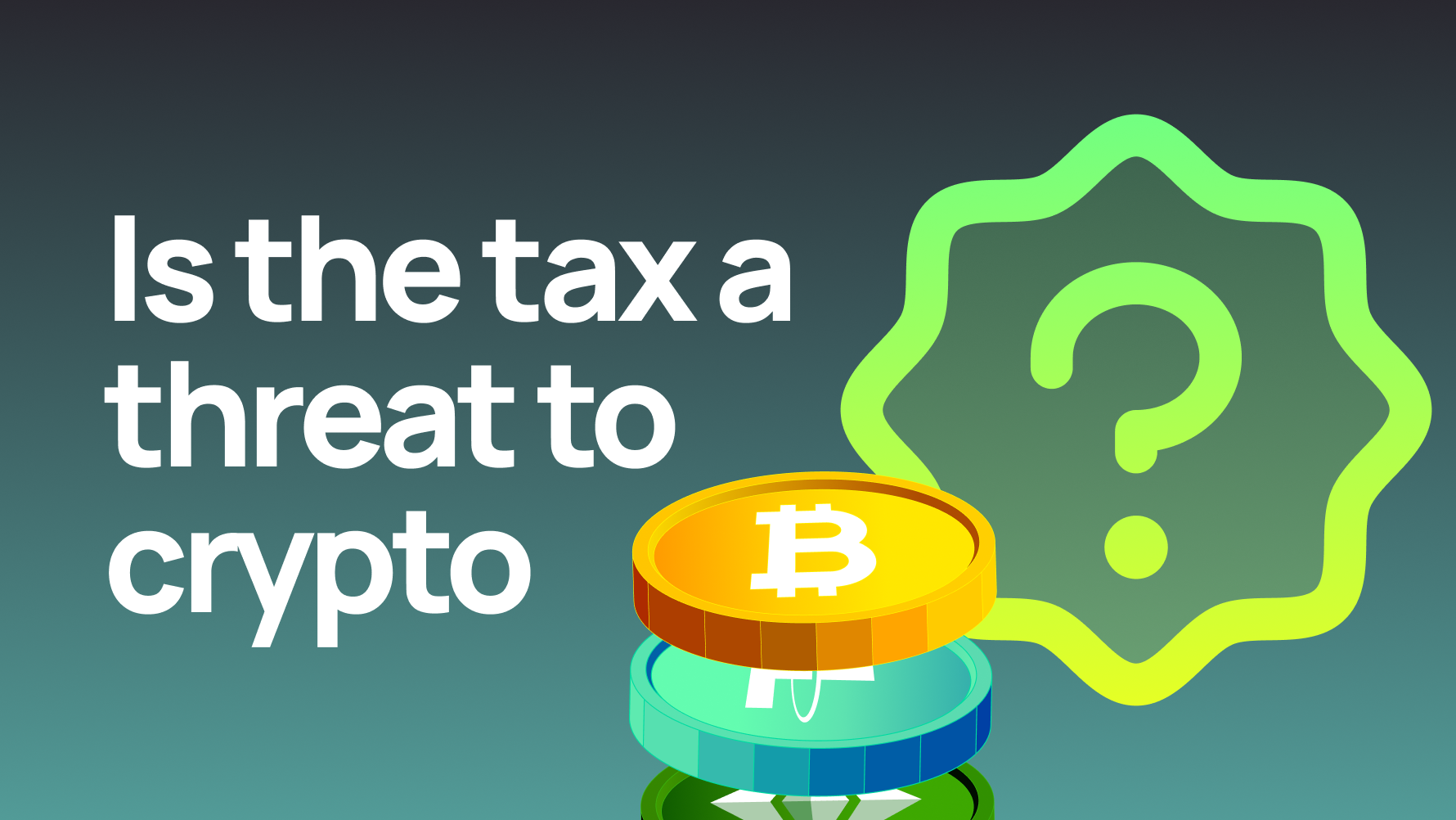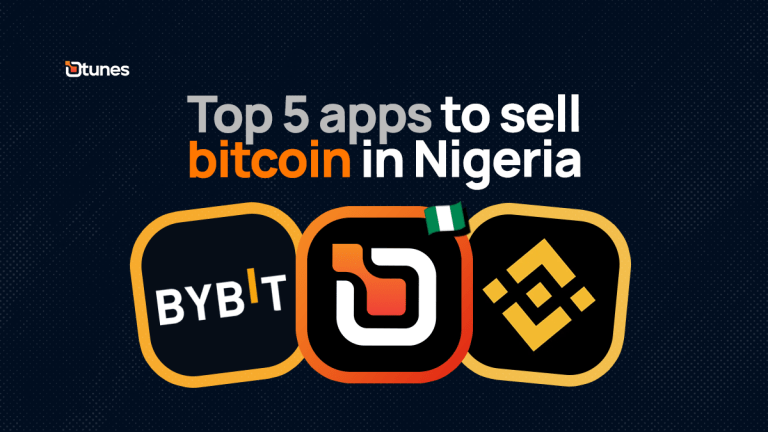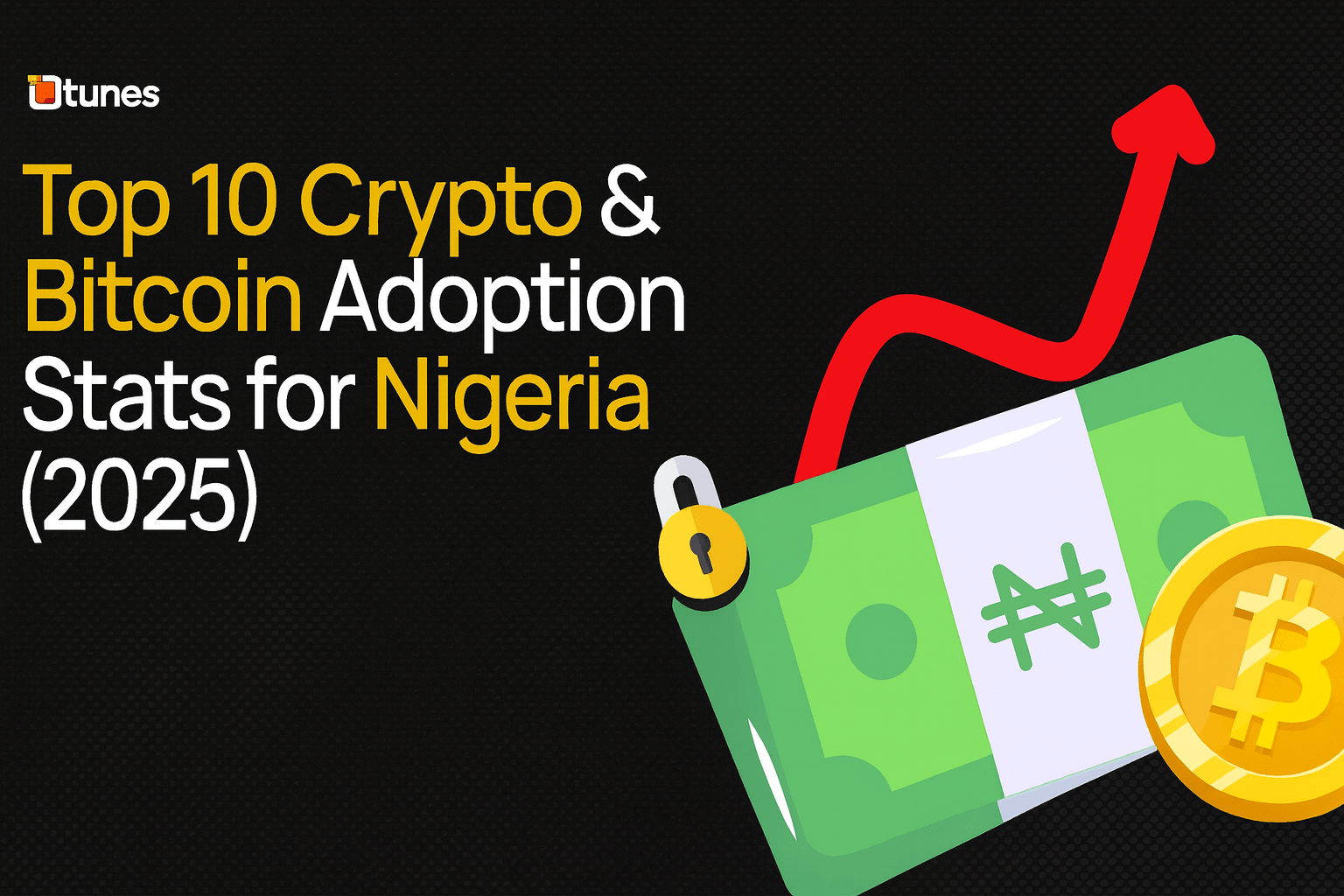
Top 10 Crypto & Bitcoin Adoption Stats for Nigeria (2025)
Crypto is no longer just a buzzword in Nigeria. It’s money in motion, a savings lifeline, and an everyday tool for millions. By 2025, Nigeria stands tall as one of the world’s largest crypto markets, fueled by young, tech-savvy people looking for a way around inflation and currency troubles.
Here are the 10 most important stats you need to know about Bitcoin and crypto adoption in Nigeria right now.
Top 10 Crypto & Bitcoin Adoption Stats in Nigeria (2025)
- Nigeria ranks 2nd globally in crypto adoption — only India is ahead (Chainalysis).
- $59 billion in crypto transactions (2023–2024)—fueled mostly by retail trades (Chainalysis).
- Stablecoins processed $22 billion in Nigeria alone — with USDT leading the pack (Yellow card).
- Stablecoins make up 40–43% of all crypto activity — showing reliance on dollar-pegged assets (Yellow card).
- 22 million Nigerians (10.3% of population) own crypto in 2025 — up from just 0.4% in 2015 (Mular).
- 33% of Nigerians are engaged in digital assets—SEC says mostly under-30s.
- 79% of investors own Bitcoin—still the market leader, followed by ETH (50%) and BNB (45%) (Report).
- 35% of Nigerian adults invest in crypto—52% are under 30; gender adoption now equal .
- Ponzi losses exceed ₦1 trillion—scams remain a huge risk in the unregulated space .
- Nigeria crypto Market revenue is projected at $2.4 billion in 2025 — with user base hitting 28.7M by 2026.
Quick Insights on the Top 10 Stats
- 2nd in Global Adoption: Nigeria sits right behind India, cementing its role as Africa’s crypto hub.
- $59B in Transaction Volume: Shows how active the market is, especially at retail levels.
- $22B in Stablecoins: Proof that Nigerians prefer dollar-backed coins to beat inflation.
- 40–43% Stablecoin Share: Almost half of all activity is tied to stablecoins, reflecting the weak naira.
- 22M Crypto Users: A ten-year leap from fringe experiment to mainstream reality.
- 33% of Nigerians in Digital Assets:A massive chunk of the 220M population is active in crypto.
- Bitcoin Still Dominates: 62% ownership shows BTC remains the face of crypto.
- Youth & Gender Balance: 52% under 30; for the first time, women match men in adoption.
- Ponzi Losses Hit ₦1T: Scams remain a huge risk without better oversight.
- $2.4B in Market Revenue: Nigeria’s crypto economy is becoming a formal revenue driver.
Best app to convert Crypto to Naira in Nigeria
From Early Curiosity to Today’s Boom
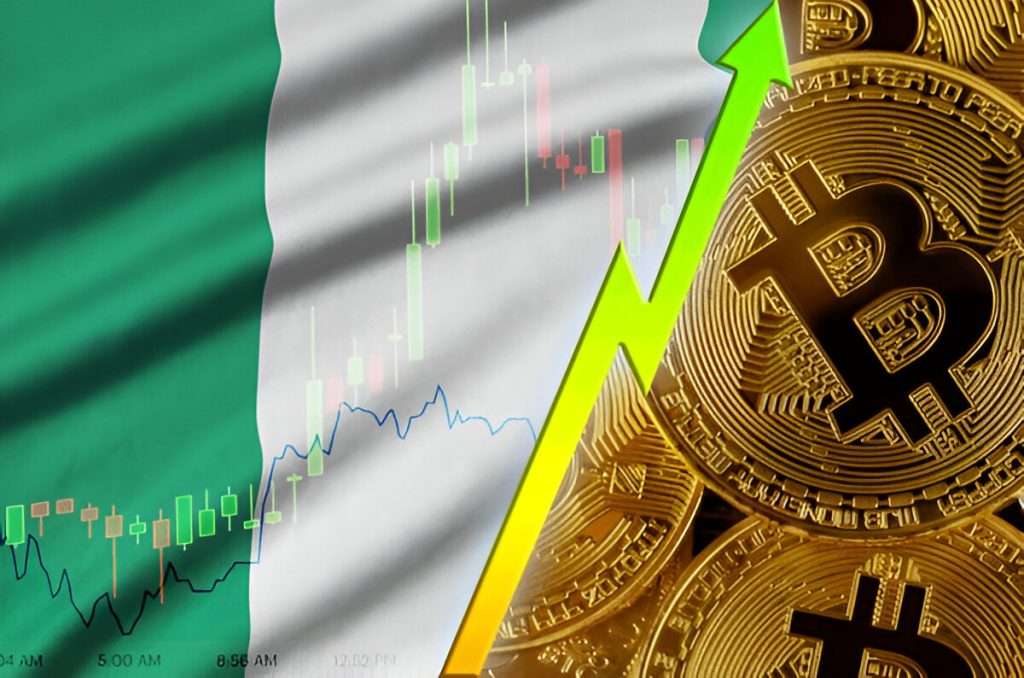
Crypto’s story in Nigeria didn’t begin with polished exchanges. It started with MMM, the Ponzi scheme that caught fire in 2015–2016. While many lost money, Bitcoin became a household name. For the first time, Nigerians saw a way to move money without banks.
By 2016, the Nigerian Bitcoin market was already valued near $1 billion, making the country the second-largest peer-to-peer trading nation worldwide. Between 2015 and 2020, Nigerians traded roughly $566 million worth of Bitcoin through P2P platforms like LocalBitcoins and Paxful.
The CBN tried to curb this in 2017 with its first warning. But instead of stopping adoption, it fueled a migration to peer-to-peer trading. Nigerians simply found new ways to connect on WhatsApp and Telegram.
What Year did Crypto Adoption explode in Nigeria
By 2020, Nigeria had become a global leader in adoption. Around 32% of Nigerians owned or used crypto, with volumes of about $400M that year—ranking third globally behind only the U.S. and Russia.
The COVID-19 era turbocharged crypto. By 2021, quarterly P2P volumes crossed $1.5 billion. Young people, especially under-30s, were driving the boom.
By 2021–2022, surveys showed:
- 35% of adults invested in crypto.
- 52% were under 30.
- Portfolios showed 76% held BTC, 50% ETH, and 45% BNB.
Perhaps most surprising, women caught up. For the first time, crypto adoption reached a 50/50 gender balance.
Where to Sell Bitcoin at the Best rate Today
Skyrocketing Adoption: 2023–2025
From 2023, crypto stopped being a side hustle. It became part of everyday finance.
Chainalysis reports Nigeria processed $59 billion in crypto transactions between July 2023 and June 2024. A striking 85% of these trades were under $1 million, meaning they weren’t from whales or institutions. They came from ordinary Nigerians saving, sending money, and paying for services.
By 2025, adoption hit record highs:
- 22 million Nigerians (10.3% of the population) owned crypto.
- Stablecoins surged, making up 43% of all retail activity.
- Market revenue is projected at $2.4 billion.
- By 2026, users are expected to climb to nearly 29 million.
This wasn’t just about Bitcoin anymore. Stablecoins like USDT became the default choice. They gave Nigerians a way to save in dollar value without worrying about the naira’s decline.
Who’s Driving Crypto Adoption in Nigeria?
Nigeria’s crypto story is powered by youth. But what started as an elite trend has spread across society.
2015–2017: Mostly male, tech graduates, 83% men.
2018–2020: Shift to students and early professionals, predominantly under 30.
2021–2022: Youth surge, equal gender balance, half under 30.
2023–2025: Everyday people—traders, freelancers, and small business owners.
Trading Volumes and Popular Coins
- 2015–2017: Bitcoin dominated. ~$566M traded on P2P platforms.
- 2018–2020: Bitcoin still king, but Ethereum and altcoins began entering conversations.
- 2021–2022: Peak P2P trading (~$1.5B a quarter). Investors diversified: BTC (76%), ETH (50%), BNB (45%).
- 2023–2025: Stablecoins became dominant. $22B in stablecoin transactions alone, making up 40–43% of activity.
Here’s your summary:
| Period | Trading Volume / Activity | Popular Coins & Market Share |
|---|---|---|
| 2015–2017 | ~$566M traded on P2P platforms | Bitcoin dominated |
| 2018–2020 | – | Bitcoin remained strongest, Ethereum and altcoins began gaining attention |
| 2021–2022 | Peak P2P trading of ~$1.5B per quarter | BTC (76%), ETH (50%), BNB (45%) |
| 2023–2025 | $22B in stablecoin transactions (40–43% of total activity) | Stablecoins became dominant |
Bitcoin still leads, but stablecoins have become the practical money of choice.
Regulation and Risks
- 2017–2019: CBN and SEC warnings, but adoption continued.
- 2021: CBN banking ban. Instead of stopping crypto, it fueled P2P growth.
- 2021–2022: Launch of the eNaira, but uptake was minimal. Nigerians stuck with USDT.
- 2023–2025: Shift toward regulation. SEC talks licensing and taxation.
Despite regulation, risks remain. Ponzi schemes have drained more than ₦1 trillion over 25 years, with ₦1.3 trillion lost in a single recent case. These losses highlight the need for clear consumer protections.
Future Outlook: 2025–2030
- 2025–2026: Retail momentum grows. 27–30M users expected. Stablecoins remain dominant.
- 2027–2028: Institutional entry. Banks and fintechs may begin offering custody and payment services.
- 2029: Crypto goes mainstream. School fees, imports, and freelancer pay in BTC/USDT. Transaction volumes could cross $100 billion annually.
- 2030: Nigeria is projected to hit 40–45M active users (~20% of the population).
Nigeria’s trajectory is clear: from curiosity to necessity, and now to global crypto powerhouse.
The Bottom Line
Nigeria’s crypto adoption story is remarkable. In just a decade, it moved from a Ponzi-scheme curiosity to a 22-million-strong user base shaping global statistics.
The numbers tell the story best: $59 billion in transactions, 22 million users, stablecoins eating 43% of the market, and Bitcoin still the favorite asset.
Crypto in Nigeria is not a trend. It’s infrastructure.
About Dtunes
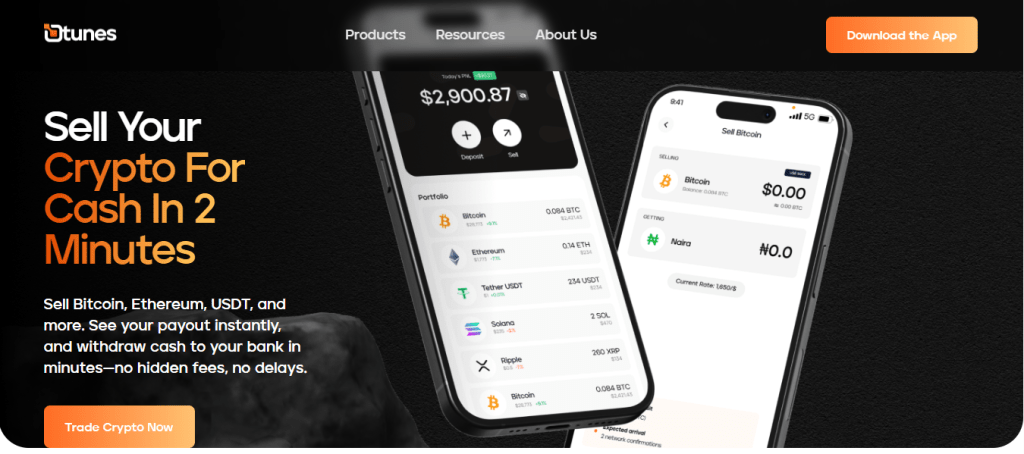
Dtunes
Dtunes is Nigeria’s seamless gateway for crypto, gift cards, and digital transactions. Built with transparency at its core, Dtunes shows you exactly how much you’ll receive in naira before you trade—no hidden charges, no guesswork.
The platform supports a wide range of assets, including USDT, Bitcoin, Ethereum, BNB, and Solana, making it easy for everyday users, freelancers, and businesses to cash out quickly and reliably.
Thousands of Nigerians already use Dtunes because it combines speed, fairness, and simplicity in one lightweight app.
Curious? Download the app today and experience cash-outs done the Dtunes way, fast, fair, and stress-free.
Godwin has spent the last 5 years making SEO magic happen and now leads as SEO Manager at Dtunes. When he’s not tweaking search rankings, you’ll catch him vibing to music, playing games, or hanging out with friends.


